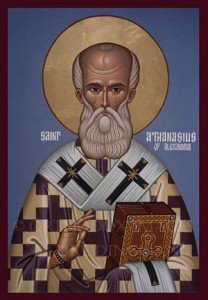Athanasius’ defense of the Son’s essential deity can be summed up in this manner:
Point 1:
The Son’s entire being belongs to and shares in the substance of the Father, “as radiance from light, and stream from source. For the Father is in the Son as the sun is in its radiance, the thought in the word, the source in the stream. The Son, then, is both in the Father substantially and derives his being from the Father. Both John 10:10, “the Father and I are one,” and John 14:10, “I am in the father and the Father is in me,” point to “the identity of the godhead and the unity of the substance.”
Point 2:
If the relationship between the Father and Son is not carefully articulated and nuanced, a number of errors can occur. For example, we can think that God possesses parts, the Father being one part and the Son another. No, Athanasius teaches, they are “one thing.” God does not have parts, as though God were a composite being constructed out of building blocks.
The moment we insist on the essential unity of the Father and Son, however, we risk thinking that no true or essential distinctions exist between Father and Son. “Father” and “Son” simply become “two names” with no essential distinctions behind them, “one thing with two names, the Son is at one time Father, at another time his own Son.” The names “Father” and “Son” become merely masks God wears as God plays out certain roles. Here, Athanasius reminds us, we encounter the heresy of Sabellius. No, “they are two, in that the Father is father and not also son; the Son is son and not also father, but the nature is one.” The true doctrine holds to essential unity and essential distinctions.
If we conceptualize the distinction between Father and Son at the expense of their substantial unity, we quickly end up with – counting the Holy Spirit – three separate gods, the heresy of tritheism. “The Son is not another God, for he was not devised from outside the Father; for then there might surely be many gods, if we assume a godhead besides the Father.”
The deity of the Son, that is, finds its source or fount in the deity of the Father. As the “offspring” of the Father, Athanasius writes, the Son is indeed distinct. But we must not allow this fundamental distinction to blur “the identity of the one godhead.”
For the radiance also is light, not a second light besides the sun, nor a different light, nor a light by participation in the sun, but a whole proper offspring of it. No one would say that there are two lights, but that the sun and its radiance are two, while the light from the sun, which illuminates things everywhere, is one. In the same way the godhead of the Son is the Father’s.
I would exhort you to take time and reflect on these arguments that Athanasius makes. They are truly quite profound.

